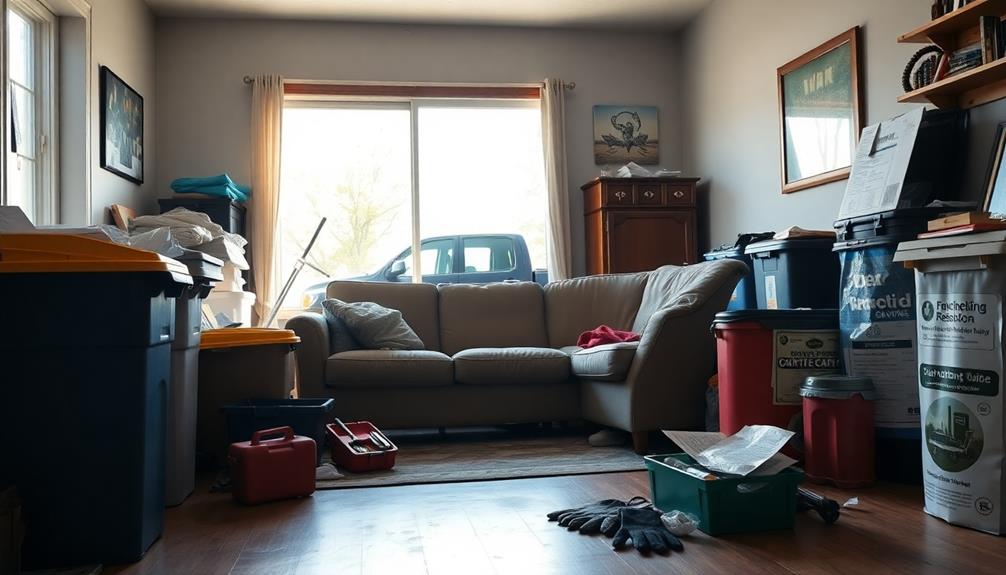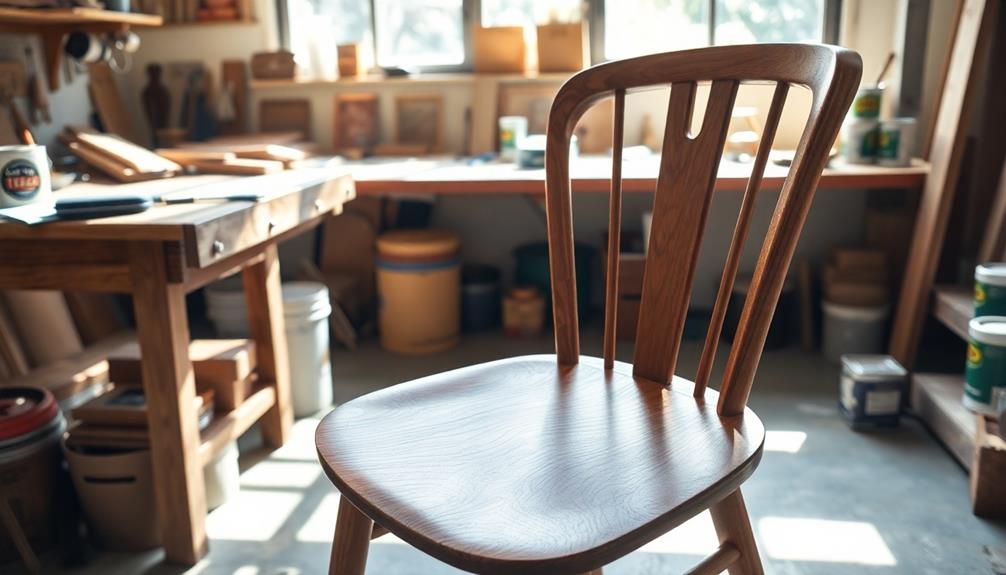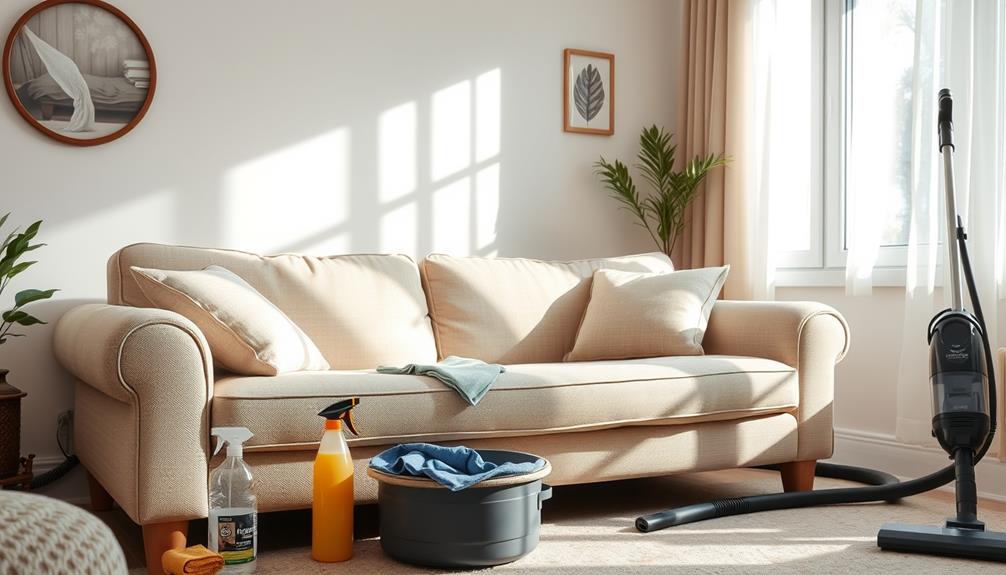To get rid of your sofa, begin by assessing its condition-check for any damage or significant stains. If it is still in good condition, consider donating it to local charities such as Goodwill or shelters. Many provide free pick-up services for sofas that are still usable. If the sofa is beyond repair, consider hiring a junk removal service for proper disposal. You can also review curbside collection guidelines or drop-off locations in your area. Renting a dumpster is another option if you have multiple items to dispose of. Each method supports sustainability, allowing you to make a positive impact. There are various options available for you to explore.
Key Takeaways
- Assess the sofa's condition for damage, cleanliness, and age before deciding on disposal or donation options.
- Contact local charities for donation opportunities or schedule a free pick-up service if the sofa is suitable for reuse.
- Utilize professional junk removal services for responsible disposal, ensuring eco-friendly practices and potential donation of usable items.
- Check local municipal guidelines for curbside collection or designated drop-off locations for bulky items like sofas.
- Consider renting a dumpster for convenient disposal, ensuring compliance with prohibited items and recycling practices during the process.
Assess the Sofa's Condition
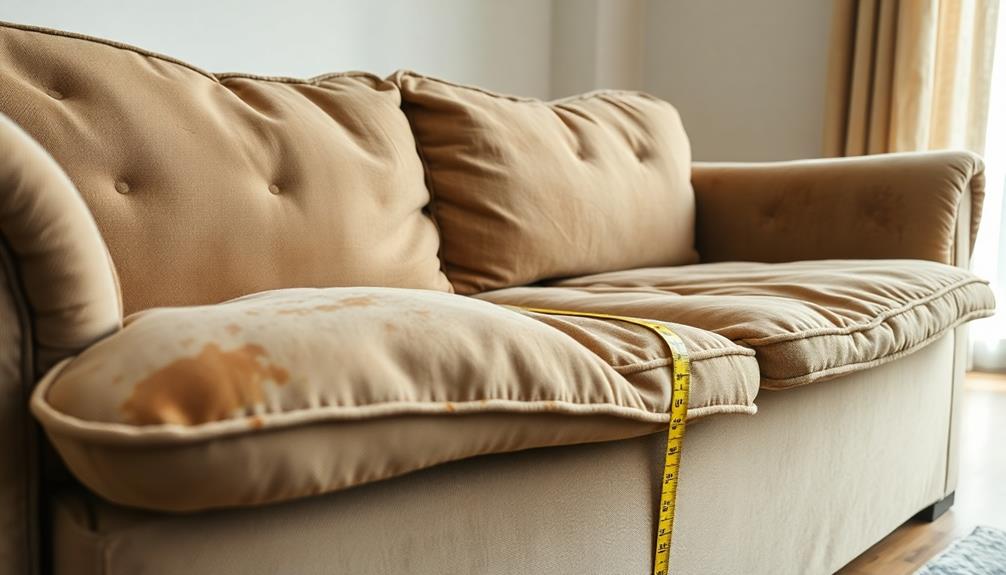
When you're ready to part ways with your sofa, the first step is to evaluate its condition. Start by checking for any visible damage, such as tears or stains. If you find significant issues, like broken components, it mightn't be usable.
Additionally, consider the potential impacts of poor storage or maintenance on your sofa's longevity, which can be likened to how pet care affects animals' health and well-being, as noted in the Ultimate Hamster Care Guide.
Next, sit on the sofa and listen for creaking sounds or wobbling; these can indicate structural problems that compromise its safety and stability.
Take a close look at the cleanliness of the sofa. If it's heavily soiled or infested, it's likely unsuitable for donation or resale.
The age of the sofa also plays a significant role; if it's over 7-10 years old and shows considerable wear, it may be time for disposal.
Lastly, don't forget to look for tags or labels that indicate the materials used. Some fabrics may require special disposal methods due to environmental regulations.
By thoroughly evaluating the condition of your sofa, you can make an informed decision about whether to donate it, recycle it, or dispose of it responsibly.
Donation Options
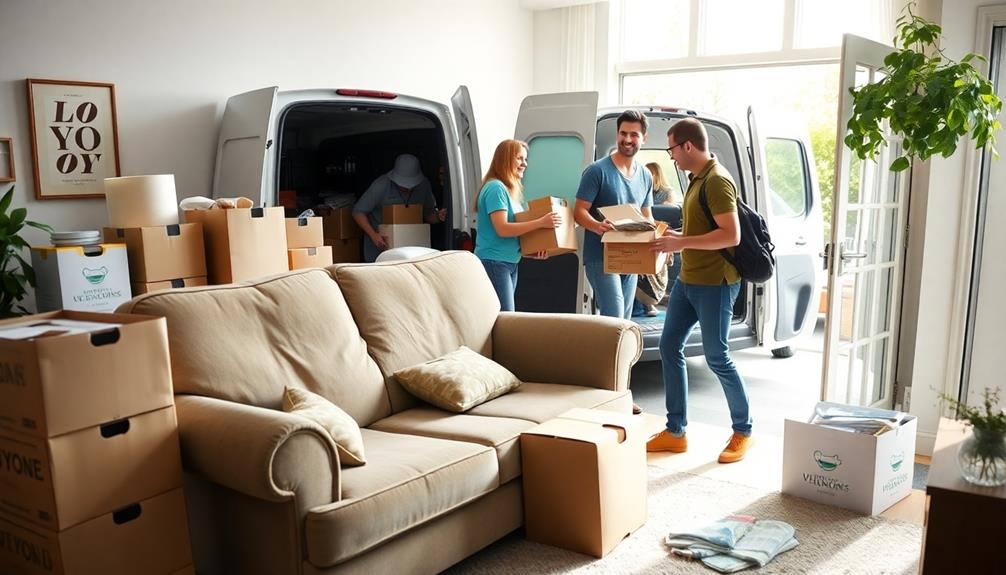
If you're considering donating your sofa, local charities like Goodwill and the Salvation Army are great options.
Many organizations accept gently used furniture, which can greatly benefit those in need while also promoting financial assistance programs for families in your community.
Make sure your sofa is clean and meets their quality guidelines, and you might even find organizations that offer free pickup for your convenience.
This way, you can help those in need while easily getting rid of your old furniture.
Local Charities Accept Donations
Donating your sofa to local charities is a great way to help families in need while promoting sustainability. Many local charities, like Goodwill and Habitat for Humanity, accept gently used sofas, turning them into valuable furniture for families.
By donating your sofa, you're not just helping others; you're also extending its lifespan and reducing landfill waste, making a positive impact on the environment. This practice mirrors the principles of responsible investing seen in trusted gold IRA options, where individuals make choices that benefit both themselves and the community.
Before donating your sofa, check its condition. Most charities have specific guidelines about the sofa condition they'll accept, so verify it's clean and usable. If your sofa meets these requirements, you're well on your way to making a meaningful contribution.
Donating your sofa can be hassle-free, as some local charities offer pick-up services for larger items. This convenience allows you to focus on the good you're doing rather than the logistics of the donation process.
Always reach out to the donation center beforehand to confirm their policies and any restrictions on the types of furniture they accept. This way, you'll verify your donation is both appreciated and beneficial to those in need.
Scheduling Donation Pick-Up
After you've assured your sofa is suitable for donation, scheduling a pick-up can make the process even smoother. Many local charities, like Goodwill and the Salvation Army, offer free pick-up services for donated sofas.
To get started, simply contact the charity directly or visit their website to book a time that works best for you. Humor can also lighten the mood during this shift, reminding us that even in letting go, laughter can be a powerful tool inspired by shared experiences.
Before scheduling, double-check that your sofa is clean and in usable condition. Most organizations only accept items that can be reused, so this step is vital.
When you arrange the pick-up, be sure to ask about specific pick-up days and availability, as these can vary by location.
Don't forget to inquire about tax deduction receipts, as some charities provide documentation for your donation. Keeping this paperwork can help you benefit financially when tax season rolls around.
Preparing Sofa for Donation
Preparing your sofa for donation requires some thoughtful attention to detail to confirm it meets the standards of local charities. To facilitate a smooth donation process, follow these steps:
- Clean the Sofa: Make sure it's free of stains and odors. A clean sofa increases its chances of being accepted. This aligns with the importance of maintaining your assets, as a well-kept item can often provide greater value, similar to how a good credit score influences loan terms.
- Check Condition: Inspect for any damage or wear. A gently used sofa is more likely to meet acceptance criteria.
- Research Donation Centers: Contact local charities like Goodwill or Habitat for Humanity to understand their specific requirements.
- Get a Receipt: Don't forget to ask for a donation receipt for tax purposes, as many organizations provide this upon collection or drop-off.
Many local charities offer free pick-up services for larger items, making it even easier to donate.
Consider reaching out to shelters, churches, or community organizations that may also benefit from your gently used furniture.
Junk Removal Services
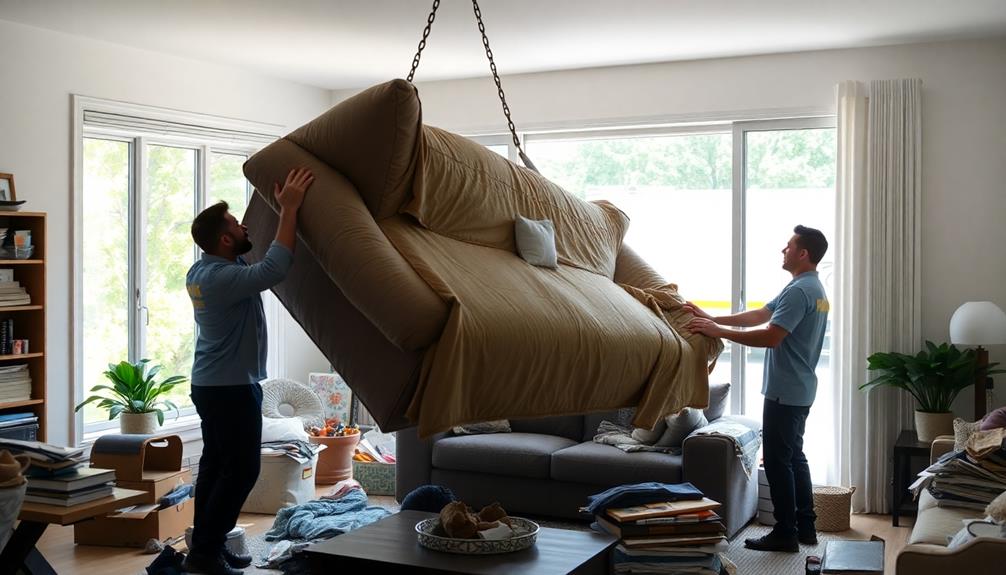
When it comes to getting rid of your sofa, junk removal services offer a convenient solution.
They not only provide professional pickup but also focus on eco-friendly disposal practices, ensuring your old furniture gets a second life through donation or recycling.
In addition, these services can help you feel safer about your decision to dispose of your items responsibly, similar to how the presence of security systems deters potential risks.
Plus, you can easily schedule a pickup that fits your busy lifestyle.
Professional Pickup Options
For those looking to dispose of a sofa without the hassle, professional junk removal services provide a convenient solution. These services can also be beneficial in areas like cold medications overview, guaranteeing you choose the right options for your needs.
Here are some key benefits to take into account:
- Easy Online Scheduling: You can quickly book your sofa pickup online, often with instant pricing and confirmation calls on your scheduled date.
- Licensed and Insured Teams: These professionals guarantee a hassle-free experience during the removal process and offer contactless pickups if preferred.
- Same-Day Pickup: If you book before noon, you can enjoy same-day service, making disposal even more convenient.
- Eco-Friendly Practices: Many junk removal companies focus on recycling options and donating usable materials to minimize landfill waste.
With sofa disposal costs starting around $85, utilizing these professional pickup options can save you time and effort.
Plus, you'll find that many services cover a wide range of areas, making them accessible for residents in different neighborhoods.
Eco-Friendly Disposal Practices
Choosing professional junk removal services not only simplifies the process of sofa disposal but also aligns with eco-friendly practices. Many reputable companies prioritize recycling and responsible disposal practices, ensuring that over 60% of the items they collect, including your old sofa, are diverted from landfills.
Additionally, these services often feature user-friendly interfaces that enhance the disposal experience, making it easier for you to schedule pickups and understand the process. By opting for these services, you contribute to sustainable waste management and can explore top platforms to earn extra income while decluttering your home.
These junk removal services often collaborate with local charities to donate usable furniture, extending the lifespan of your sofa while helping those in need. This approach not only benefits the environment but also fosters community support.
When you choose a professional service, transparent pricing becomes a hallmark of the experience, allowing you to understand the costs associated with eco-friendly disposal.
You won't have to worry about the hassle of transporting heavy items; the professionals handle it, ensuring your sofa is disposed of responsibly. Many of these companies are dedicated to minimizing their environmental impact by reusing materials and adhering to local regulations.
Donation and Recycling Opportunities
While you might be ready to part with your old sofa, numerous donation and recycling opportunities can confirm it doesn't just end up in a landfill.
Proper disposal methods not only benefit the environment but also support those in your community in need of furniture. Here are four great options to reflect on:
- Local Charities: Organizations like Goodwill or Habitat for Humanity often accept gently used sofas, helping those in need while extending the furniture's lifespan.
- Junk Removal Services: Many of these services prioritize eco-friendly practices, recycling or donating over 60% of the items they collect. You can find eco-friendly cleaning services that confirm your sofa is handled responsibly.
- Transparent Pricing: Reputable junk removal companies provide free estimates and clear pricing, so you won't face hidden fees or unexpected costs.
- Proper Disposal: Trusted services confirm your sofa is disposed of according to local regulations and environmental guidelines.
Curbside Collection Guidelines
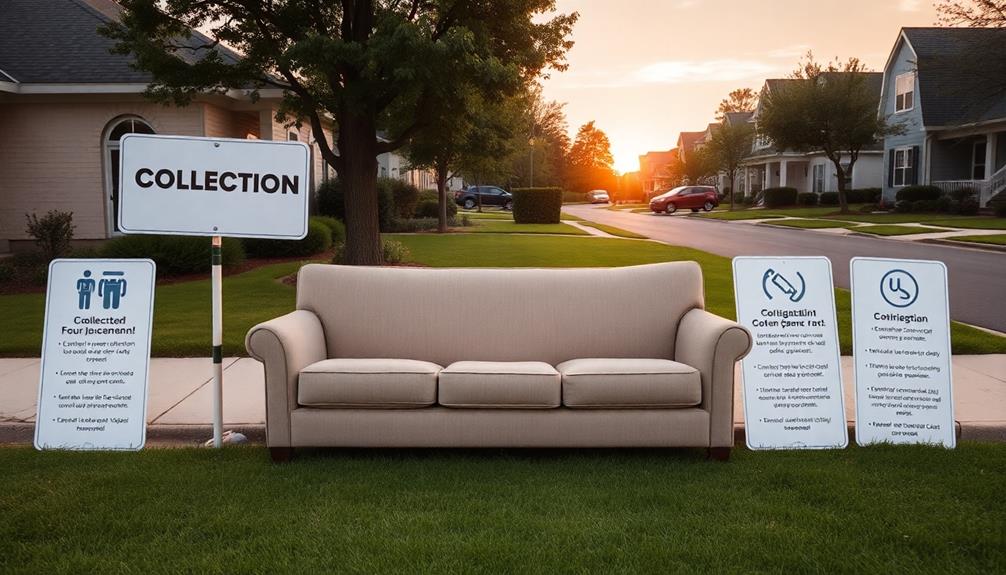
When you're ready to dispose of your sofa, it's crucial to follow local curbside collection guidelines to guarantee a smooth process. Many communities have specific regulations regarding bulky item disposal, similar to those for water parks that provide different experiences for visitors.
First, check your local guidelines for curbside collection and furniture removal. Many areas require you to schedule a bulky item pickup in advance, as services often designate specific days for such collections.
On your scheduled pickup day, place your sofa outside for easy access. If your sofa exceeds size limitations set by local waste management, break it down into manageable pieces. This not only assures compliance with local regulations but also helps the collection team handle your item more efficiently.
Be mindful of hazardous materials; don't include items like batteries or electronics with your sofa during curbside collection, as these can complicate the disposal process.
Following these disposal methods will help you avoid potential fines or missed collections. By adhering to the guidelines, you guarantee that your sofa is disposed of properly and responsibly, making space in your home without hassle.
Drop-off Locations
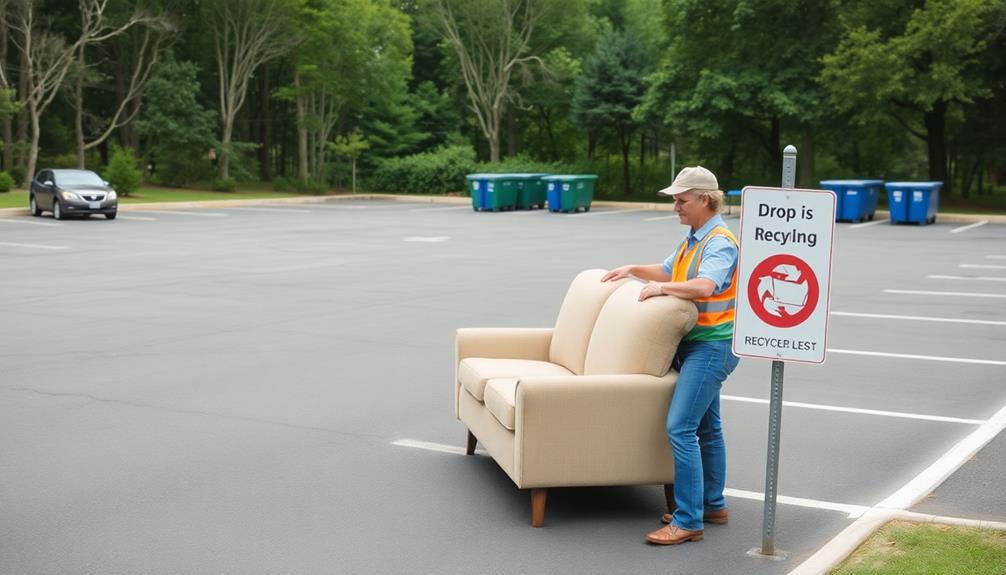
Finding the right drop-off location for your sofa can simplify the disposal process. Here are a few tips to help you navigate:
- Check local municipal websites: They often list designated drop-off locations for bulky items like sofas.
- Visit the Citizens Convenience Center: This facility accepts bulky item drop-offs but verify their rules and any potential gate fees.
- Know landfill options: Landfills and transfer stations provide proper disposal methods for large items, making sure you don't face fines for improper disposal.
- Comply with refrigerant disposal regulations: If your sofa includes appliances, make sure they adhere to environmental guidelines.
Before you head out, double-check the operating hours of your chosen drop-off locations.
It's vital to use designated sites for your bulky items to avoid penalties. By following these steps, you can guarantee a hassle-free experience when disposing of your sofa while adhering to proper disposal methods and environmental regulations.
Renting a Dumpster
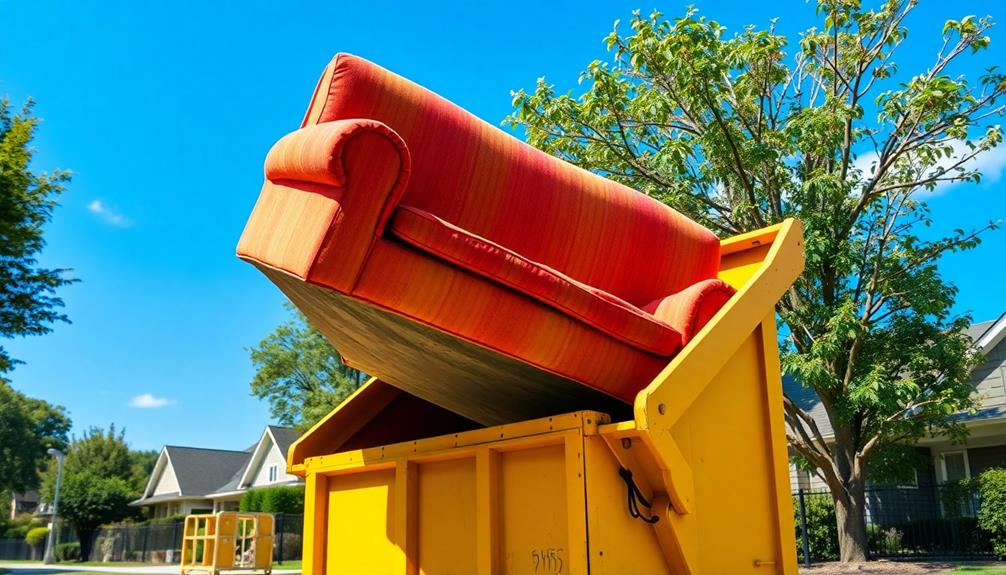
Renting a dumpster offers a convenient and efficient way to dispose of your sofa and other bulky items.
Whether you're tackling a home renovation or just decluttering, this option simplifies your disposal needs. Most dumpster rental companies provide up-front quotes, allowing you to budget without worrying about hidden fees.
When renting a dumpster, it's essential to select the appropriate dumpster size. Many companies offer various options, including mini roll-off dumpsters for smaller projects.
Make sure to choose one that fits your bulky waste, so you don't end up with overflow.
Before placing your sofa in the rented dumpster, check for any prohibited items listed by the rental company. Some materials can't be disposed of this way, and you'll want to avoid any potential extra charges.
One great benefit of renting a dumpster is that it can be an environmentally friendly option.
Many companies focus on proper sorting and recycling of materials during the disposal process, ensuring that as much as possible is reused.
This way, you can feel good about your choice while efficiently getting rid of your old sofa.
Responsible Recycling Practices
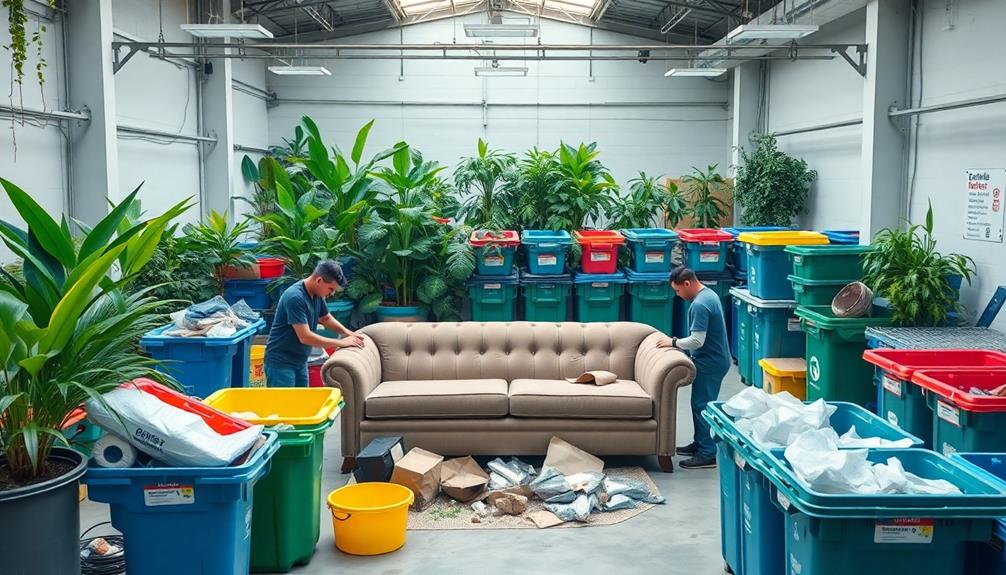
Responsible recycling practices for sofas not only help reduce landfill waste but also give your old furniture a second life. By considering these options, you can contribute to community cleanliness and the environment:
- Donation: Collaborate with local charities that accept furniture donations. This helps those in need and minimizes waste.
- Bulk item pickup: Check if your municipality offers curbside bulk item pickup services. This makes recycling convenient and guarantees adherence to local recycling guidelines.
- Junk removal services: Contact eco-friendly junk removal services that prioritize recycling and donation. They often divert over 60% of disposed items from landfills.
- Material awareness: Be mindful of hazardous materials in sofas, like treated fabrics and certain foams. Proper disposal is essential to prevent environmental harm.
Frequently Asked Questions
How Do I Get Rid of My Old Sofa?
To get rid of your old sofa, you can schedule an online pickup service or sell it on platforms like Craigslist. Just remember to place it outside for easy access by the removal team.
How Do I Get Rid of an Old Sofa for Free Near Me?
Think of your old sofa as a ship ready to sail. You've got options: donate it to local charities, list it on community platforms, or check for free pick-up services in your area.
How Do You Break Down a Sofa for a Dump?
To break down a sofa, you'll need tools like a screwdriver and utility knife. Remove cushions, detach legs, and cut through fabric. Then, dismantle the frame into smaller pieces for easier transport to the dump. Be sure to keep track of any screws or fasteners that may need to be saved for proper disposal or recycling. As you continue disassembling your sofa step by step, consider labeling or grouping components to stay organized. Finally, wrap sharp edges or loose nails in protective coverings to prevent accidents during handling.
How to Get Rid of an Old Dirty Couch?
Did you know that around 9 million tons of furniture ends up in landfills each year? You can avoid that by donating your old couch, scheduling a pickup, or checking local bulk waste collection days.
Conclusion
When it comes to disposing of your sofa, remember that it's not just furniture; it holds memories and stories. By choosing to donate or recycle it, you're giving it a chance to create new moments for someone else. Think about the joy it could bring to a family in need or the impact of reducing waste in landfills. So, take a moment to reflect—your old sofa can still have a meaningful life beyond your living room.
